Emily C.A. Snyder's Blog, page 11
December 4, 2011
Gothic Travelogue: How to be Abducted (True Story)
When traveling to Paris, it is important that you do not get abducted.
Or, if you do nearly get abducted, you can at least put it into a book! I speak, both times, from experience.
In Nachtsturm Castle , Catherine Tilney is wise enough not to go to Paris alone (well, she and Henry are on their honeymoon!), but while at Notre Dame, she sees an American woman who's being cornered by an over-amorous Creole man. Now, the truth is that I was that American woman, and the man was actually Nigerian.
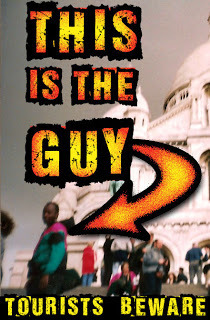 Round and around theyran, and if the child was nimbler, then Henry was more determined. He cornered the boy at last at the edge ofthe Seine, interrupting an over-ardent Creolegentleman and an immediately grateful New Englandwoman...
Round and around theyran, and if the child was nimbler, then Henry was more determined. He cornered the boy at last at the edge ofthe Seine, interrupting an over-ardent Creolegentleman and an immediately grateful New Englandwoman...
The gypsy thussatisfied, she once again resumed her game of tossing the eldest child atlikely victims – which now included the amorous Creole, much to thelong-suffering New Englander's delight.
~ Chapter III, Nachtsturm Castle, "Wherein Our Adventurers Encounter the Foreign and Familiar"
Unfortunately, no gypsies came to my rescue at Notre Dame , but that's the fun of fiction: you can right realistic wrongs.
There are a few ways to make sure you are Not Abducted:
1) Do not go to Paris alone.
When traveling from Avignon, after a wonderful trip through southern France, accompanied by classmates, a professor and a priest, no matter how many dogs you see hopped up on cocaine, no matter how feverish members of your party are becoming, no matter how badly it's raining, and especially no matter how long it takes the train for Louvre (where your party is going next) to arrive, do not go to Paris alone.
Even if it's six in the morning and you've been waiting all night with the drugged-out dog, and a bunch of sketchy looking people, and your quickly-sickening party. Even if the train to Paris comes first and you're in a bad mood because the people in Avignon have been correcting your too-Parisian pronunciation all night. For example:
AT THE RESTAURANT.
FRIEND. Hey, Emily, can you ask for more butter?
ME. Yup. (To the waitress.) Oh, pardonnez-moi, plus de beurre s'il vous plaît? (Buhr for butter.)
WAITRESS. Buuuuuuh-ruh.
ME. Quoi?
WAITRESS. Buuuuuuuuuh-ruh.
ME. Buh-ruh.
WAITRESS. Buuuuuuuuuuuuuuuuuuuuuh-RAH.
ME. Buuuuuuuuuuuuuuuuuuuuuuuuh-RURH?
WAITRESS. Non non non.... (And so on.)
AT THE TICKET BOOTH.
ME. Bonjour! (Pointing to the train schedule.) C'est le train pour Lourdes? (Stumbling a bit on the pronunciation for Lourdes, since I'm not quite sure.)
TICKET GUY. Loooooou-druh?
ME. Loooou-druh. Merci, oui. Est-ce que le train pour Loooooou-druh?
TICKET GUY. Non non non. Looooooooooou-druh!
ME. Oui. Looooou-DRUH!
TICKET GUY. Non. Écoutez-moi. LOOOOOOOOOOOOOU-druh.
ME. LOOOOOOOOOOOOOOOOU-druh! C'est le train?
TICKET GUY. Non.
AT THE TICKET BOOTH. AGAIN.
The next morning, when the ticket booth re-opens, and the train for freaking LOOOOOOOOOOU-druh hasn't come, and I am wet, and feverish, and freaking out over that cocaine dog.
(The ticket booth opens. I attack it.)
ME. (Slamming down the train schedule.) Pardonnez-moi. Ou est-ce que le train pour Lourdes? L-O-U-R-D-E-S comprendez-vous?!?!?!?!??!?!?!?
FRIGHTENED TICKET GUY. Oui!
Somewhere in Avignon, that fellow is telling the story of the morning a crazy American woman attacked him before he even had his coffee. Regardless, no matter how pissed off at the southern French you are, the fact remains the same: do NOT go to Paris alone.
2) If you do go to Paris alone, remember that the bathroom is your friend.
Actually, just remember this whenever you're traveling. Especially when you have no money. The bathroom is your friend. Rather like the Muppets had their lockers in Muppets Take Manhattan , so the savvy traveler finds the nearest bathroom and stakes their claim. It's better than a flag .

Having not the first lesson of how not to be seen abducted, I at least knew the second, and as soon as I got off the train from Avignon to Lourdes, much the worse for the wear, I went in search of a bathroom.
I paid my money and claimed a stall, where I could regroup. I had 80 francs, which is not very much - especially since I still had to buy a ticket on the Orient Express to get home to Austria.
I had a map (point Emily)...
But I hadn't slept (point abduction).
Far from really studying the map in the relative safety and privacy of the bathroom, I made the mistake of going out on my own. Carrying a big map. And looking lost.
3) Sometimes it's better to play the dumb American card.
One of the first things we were taught when we went to Europe was that it was important to learn foreign phrases in order to say "Hello" and "Thank you" when you went in and out of shops. It was considered polite. I have a fairly good ear for languages , and so despite southern France determined to change my Parisian accent, I got along well lingually (if not grammatically) in France.
However, when I was attempting to go into the brave new world from the train station, I couldn't find the exit (sortie). I did find an information booth, however, and so I stood in line to ask where the exit was. By this time, I was thinking in French but getting a little tired of it. So, when I got up to the disgruntled information woman, the conversation went like this:
AT THE INFORMATION BOOTH
DISGRUNTLED WOMAN. Oui. ME. Bonjour. Pardonnez-moi...parlez vous Anglais?DISGRUNTLED WOMAN. (With a grin that suggests otherwise.) Non. Nous parlons Francais. ME. D'accord. (In my best Texan speaking French.) Ooooo! Esk-eh la SORE-tee?
DISGRUNTLED WOMAN. (With a very sour expression.) Derrière vous. (Behind you. This was embarrassingly true.)
ME. Mercy.
Moreover, had I only feigned ignorance of French, I would never have understood my abductor who came up to me as I stood on the street corner with my map out and a confused expression on my face. As it was, he fell into pace with me just as I had chosen a direction and asked (in French) if I knew the way to the Gare de l'Est. I told him that I was headed that way myself, and he said, "Well, let's walk there together!" And I, seeing him as an angel of mercy (besides, he was black and black people are good, because white people have oppressed them), said, "Sure!"
My abduction began.
4) Just because you're fat, doesn't mean you're invulnerable. Or Stop Thinking Like a Westerner!
As an American with more to love, I've spent my whole life sure that since my body does not conform to our current Barbie-ideal of beauty, that I am therefore best used as a meat shield. Coupled with a natural inclination to pig-headedness, I knew that while I had heard tales of amorous Latin gentlemen, I would not prove tempting to them. I'd forgotten, however, that Rubens liked himself a large women, and there are all those fertility goddesses running around modelling the latest in globe couture.
So, those of you women looking for an ego boost! Get thee to a Parisian street corner, whip out your map, wear your dumpiest clothes, and just wait for would-be abductors to pick you up! If you have 80 francs on you, and speak a little French, you can also get to sight-see with your abductor, who does this for a living.
Which brings me to a corollary: 4A) If the women in your family have a history of being abducted in Paris...freaking learn from them!!!
It's true. When my mother and grandmother traveled together to Paris in the 60's, they got fed up with each other one afternoon, and decided to go their separate ways. My grandmother, who has always been a model of grace, was approached by an amorous Parisian whom she easily deflected.
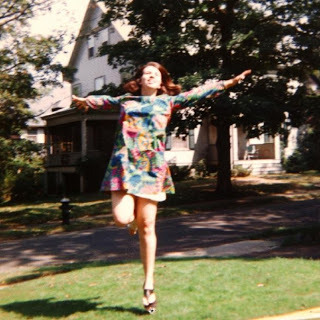 At the same time, on the steps of Sacré-Coeur
At the same time, on the steps of Sacré-Coeur
my mother (see left) had a Spaniard pestering her. He kept asking her what she was doing later, and she kept trying to deflect him in her broken French. Finally, she screamed, "I must pray!" and rushed up the stairs to the Basilica.
Did I learn anything from my maternal line? Nope. I learned that I wanted to see Sacré-Coeur for myself. So when my abductor asked me whether I was really going to go back to Austria right away without seeing anything of Paris, I answered him, "Well, I have always wanted to see Sacré-Coeur."
5) If he isn't running off with your luggage, be wary of what he does want to run away with.
Now, when I foolishly said, "I've always wanted to see Sacré-Coeur," what I was most worried about at that point was that he wanted to steal my luggage. If only. You can trust a thief. So, thinking I was very clever, I trudged along carrying my really heavy bag. We got on a bus; I paid for both of us. And suddenly, I found myself at Notre Dame. Not Sacré-Coeur. This was the first moment that I realized something was wrong.
"This guy," I thought, "has done this before." However, since we were already at Notre Dame and I did want to see it, we went in. I admired the rose window, he attempted to whisper something about how "anciens" everything was (which is how I learnt the French for "ancient"), and then I took a page from my mother's book and threw myself down in front of a pieta and prayed.
"Dear God," I prayed, very much in English, "I have no clue what's going on, but I'm pretty sure that I just fell into something incredibly dangerous. If you could just make this man go away, because I can't be rude to him because 1) I wasn't brought up that way and 2) I'm not thinking straight and 3) the only swear I know in French is very rude and I've been trying not to swear and 4) he's black and I'm white so I have to be nice to him. But You can just make him...go away. Please please please?"
My abductor reappeared.
I glared at the statue with an accusatory eye, that said, "I'll see you in a few at Sacré-Coeur, and then we're really going to have words, You and I."

We went into the courtyard of Notre Dame, where I was met by my first gypsy (see this post) who was absolutely no help at all. We got on a bus; I paid. We came at last to Sacré-Coeur, where by this time the fellow was holding my hand and kissing my cheek. I thought: "Oh, hell's bells. He isn't trying to take my luggage, I have no idea how to get to the Gare de l'Est now...the least he can do is hold my bag."
We saw Sacré-Coeur, I snapped his picture under the pretense of taking a photo of the basilica, and once inside and again firmly and determinedly praying to keep him away from me, I started doing the first vaguely sensible thing I had done all that day:
6) Don't just pray about it -MAKE A PLAN!
This was my pickle: I didn't know where I was. The man had my map andall my belongings. I was running out of money, which I needed to gethome.
I found my backbone and declared that I was going home.
He said: "Let's just sit in this park, first."
It was a beautiful park, and since I have asthma and there are a lot ofstairs, I decided we could sit in the park. We sat on a bench, he stillholding my hand, and then rubbing my neck, and then suddenly kissing myneck. I whirled around and yelled out, "NON!"
I didn't slap him. I wish I had.
He looked startled. Remember this ladies, the power of"Non!"
ME. Take me to the Gare de l'Est.
ABDUCTOR. You are so confusing.
ME. I'm very simple. Let's go.
ABDUCTOR. Let's take a bus.
ME. No. I've got to catch my train. It leaves very soon.
ABDUCTOR. (Picking up my bag and grabbing my hand.) OK, OK,we'll go.
ME. Great.
(We start walking, hopefully, towards the right train station. After a few minutes:)
ABDUCTOR. You know, you don't have to leave.
ME. Yes, it's very important that I leave.
ABDUCTOR. What time is your train?
ME. (Hesitating, because I hate lying, and I hadn't learned aboutequivocation yet.) Six.
ABDUCTOR. That's in four hours! Look, do you have any money?
ME. No.
ABDUCTOR. You can stay at my place. It's OK. Nothingwould happen to you. You can sleep with my sister. But you shouldstay. You haven't seen the Eiffel Tower.
ME. I don't want to see the Eiffel Tower.
ABDUCTOR. But you've got four hours. And Paris is beautiful.
ME. I need to prepare myself...um...spiritually preparemyself...to take the Orient Express. (This is perhaps the lamestexcuse I have ever come up with for anything.)
ABDUCTOR. Fine. We'll go to the Gare de l'Est.
ME. Good.
ABDUCTOR. But you can change your mind at any time.
ME. Uuuuuuuuuuuugh!
7) When you are near freedom, grow a spine and kick that abductorout! Grrrrl POWER!
When we finally came to the welcome sight of the Gare de l'Est, I nearlywept for joy. I thanked the man, and reached for my bag, but he took aseat right next to me and said that he would stay.
I would like to point out that if this had happened today (which itwouldn't; because I've learnt from the time it did happen), I would havejust kicked him in the nadgers, called the police, and sauntered out ofthere. However, there are dangers to being polite.
I attempted to argue that I really needed to prepare myself, spiritually andmentally to make the journey home.
He didn't answer.
I pulled together all my gumption...and told him to leave.
Then the bastard looked at me, and said, "If you give mesomething."
ME. What.
ABDUCTOR. A kiss.
ME. What?! (Because I was sure I had heard him wrong.)
ABDUCTOR. A kiss. Sur la bouche. (Lit. On the mouth.)
Again, I disbelieved my ears, and patted my cheek. Word to the wise,ladies, kick the nadgers. Never fear to kick the nadgers. *sigh*
He repeated: on the mouth.
I tapped my cheek firmly again, and began babbling about how I needed to be reallyreally zen to get on the Orient Exp....
Which is when my abductor grabbed me by the neck and attacked my face withhis tongue.
Fortunately, I had the good fortune to clamp my lips together tighter thanthe locks on Fort Knox.
He backed away, with a smirk on his face. He dumped my bag.
ABDUCTOR. Au revoir.
ME. Au revoir.
ABDUCTOR. Donne-moi 10 francs.
I threw the money at him. He stooped to pick it up and sauntered off.
8) It's OK to cry.
Once he was finally gone, I grabbed my bag and ran down the trainstation. Finding a bank of empty seats, I threw myself into one, and mybag onto the other, and myself on the bag, and proceeded to have a good, longcry.
9) It's just as important to laugh.
At some point during my cry, it hit me that there were probablypeople watching me. And that, to them,our scene may have looked like a romantic break-up.
I couldn't help it. I startedlaughing and laughing and laughing.
And then I settled in to wait four hours for the Orient Express.
10) You can also be healed.
After my disastrous trip to Paris, I had no desire whatsoever toreturn. But about a month later, afriend of mine asked me to travel to Lisieux, France. I hesitated, and then reasoned that 1) I wouldbe traveling with someone and 2) wewould not be stopping in Paris, justtaking the train through.
I agreed to go.
The trip was really delightful. Welived on a six-foot baguette and a jar of Nutella. We found the second cleanest bathrooms inEurope (the cleanest being, naturally, in the Vatican). My friend even washed her hair in thesink. We stumbled on a small Mass beingsaid in French, and I was thrilled that I could understand most of the sermon(on St. Mary Magdalene).
But when we travel up to Paris, I began growing nervous. We would be arriving at night to catch theOrient Express. Once again we'd have tomake our way from Gare du Nord to Gare de l'Est. And this time, we'd left the map at home.
This time, though, I'd learnt frombefore. Since there were two of us, weweren't accosted. We took the timehuddled up near the bathrooms to snag a map of the metro and a map of Paris andplan our route. We still had very littlemoney – just enough for transportation – but I saw that the Palais GarnierOpera House was between where we were and where we wanted to go.
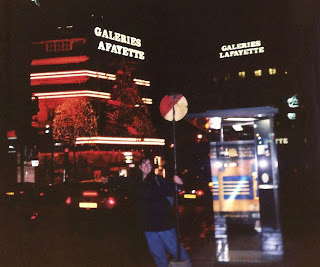 I convinced my friend that we could get off to take a look at the Operahouse and still have enough time to walk up the Rue de Lafayette to ourtrain. She agreed.
I convinced my friend that we could get off to take a look at the Operahouse and still have enough time to walk up the Rue de Lafayette to ourtrain. She agreed.
And when we emerged from the Metro, therewas the Opera House, lit up gorgeously, with Parisians in ball gowns and tuxedosand SILK LINED CAPES! and TOP HATS!!! spillingout from intermission.
I threw wide my arms, and cried out: "I AM HEALED!"
HERE ENDETH THE LESSON.
Or, if you do nearly get abducted, you can at least put it into a book! I speak, both times, from experience.
In Nachtsturm Castle , Catherine Tilney is wise enough not to go to Paris alone (well, she and Henry are on their honeymoon!), but while at Notre Dame, she sees an American woman who's being cornered by an over-amorous Creole man. Now, the truth is that I was that American woman, and the man was actually Nigerian.
 Round and around theyran, and if the child was nimbler, then Henry was more determined. He cornered the boy at last at the edge ofthe Seine, interrupting an over-ardent Creolegentleman and an immediately grateful New Englandwoman...
Round and around theyran, and if the child was nimbler, then Henry was more determined. He cornered the boy at last at the edge ofthe Seine, interrupting an over-ardent Creolegentleman and an immediately grateful New Englandwoman...The gypsy thussatisfied, she once again resumed her game of tossing the eldest child atlikely victims – which now included the amorous Creole, much to thelong-suffering New Englander's delight.
~ Chapter III, Nachtsturm Castle, "Wherein Our Adventurers Encounter the Foreign and Familiar"
Unfortunately, no gypsies came to my rescue at Notre Dame , but that's the fun of fiction: you can right realistic wrongs.
There are a few ways to make sure you are Not Abducted:
1) Do not go to Paris alone.
When traveling from Avignon, after a wonderful trip through southern France, accompanied by classmates, a professor and a priest, no matter how many dogs you see hopped up on cocaine, no matter how feverish members of your party are becoming, no matter how badly it's raining, and especially no matter how long it takes the train for Louvre (where your party is going next) to arrive, do not go to Paris alone.
Even if it's six in the morning and you've been waiting all night with the drugged-out dog, and a bunch of sketchy looking people, and your quickly-sickening party. Even if the train to Paris comes first and you're in a bad mood because the people in Avignon have been correcting your too-Parisian pronunciation all night. For example:
AT THE RESTAURANT.
FRIEND. Hey, Emily, can you ask for more butter?
ME. Yup. (To the waitress.) Oh, pardonnez-moi, plus de beurre s'il vous plaît? (Buhr for butter.)
WAITRESS. Buuuuuuh-ruh.
ME. Quoi?
WAITRESS. Buuuuuuuuuh-ruh.
ME. Buh-ruh.
WAITRESS. Buuuuuuuuuuuuuuuuuuuuuh-RAH.
ME. Buuuuuuuuuuuuuuuuuuuuuuuuh-RURH?
WAITRESS. Non non non.... (And so on.)
AT THE TICKET BOOTH.
ME. Bonjour! (Pointing to the train schedule.) C'est le train pour Lourdes? (Stumbling a bit on the pronunciation for Lourdes, since I'm not quite sure.)
TICKET GUY. Loooooou-druh?
ME. Loooou-druh. Merci, oui. Est-ce que le train pour Loooooou-druh?
TICKET GUY. Non non non. Looooooooooou-druh!
ME. Oui. Looooou-DRUH!
TICKET GUY. Non. Écoutez-moi. LOOOOOOOOOOOOOU-druh.
ME. LOOOOOOOOOOOOOOOOU-druh! C'est le train?
TICKET GUY. Non.
AT THE TICKET BOOTH. AGAIN.
The next morning, when the ticket booth re-opens, and the train for freaking LOOOOOOOOOOU-druh hasn't come, and I am wet, and feverish, and freaking out over that cocaine dog.
(The ticket booth opens. I attack it.)
ME. (Slamming down the train schedule.) Pardonnez-moi. Ou est-ce que le train pour Lourdes? L-O-U-R-D-E-S comprendez-vous?!?!?!?!??!?!?!?
FRIGHTENED TICKET GUY. Oui!
Somewhere in Avignon, that fellow is telling the story of the morning a crazy American woman attacked him before he even had his coffee. Regardless, no matter how pissed off at the southern French you are, the fact remains the same: do NOT go to Paris alone.
2) If you do go to Paris alone, remember that the bathroom is your friend.
Actually, just remember this whenever you're traveling. Especially when you have no money. The bathroom is your friend. Rather like the Muppets had their lockers in Muppets Take Manhattan , so the savvy traveler finds the nearest bathroom and stakes their claim. It's better than a flag .

Having not the first lesson of how not to be seen abducted, I at least knew the second, and as soon as I got off the train from Avignon to Lourdes, much the worse for the wear, I went in search of a bathroom.
I paid my money and claimed a stall, where I could regroup. I had 80 francs, which is not very much - especially since I still had to buy a ticket on the Orient Express to get home to Austria.
I had a map (point Emily)...
But I hadn't slept (point abduction).
Far from really studying the map in the relative safety and privacy of the bathroom, I made the mistake of going out on my own. Carrying a big map. And looking lost.
3) Sometimes it's better to play the dumb American card.
One of the first things we were taught when we went to Europe was that it was important to learn foreign phrases in order to say "Hello" and "Thank you" when you went in and out of shops. It was considered polite. I have a fairly good ear for languages , and so despite southern France determined to change my Parisian accent, I got along well lingually (if not grammatically) in France.
However, when I was attempting to go into the brave new world from the train station, I couldn't find the exit (sortie). I did find an information booth, however, and so I stood in line to ask where the exit was. By this time, I was thinking in French but getting a little tired of it. So, when I got up to the disgruntled information woman, the conversation went like this:
AT THE INFORMATION BOOTH
DISGRUNTLED WOMAN. Oui. ME. Bonjour. Pardonnez-moi...parlez vous Anglais?DISGRUNTLED WOMAN. (With a grin that suggests otherwise.) Non. Nous parlons Francais. ME. D'accord. (In my best Texan speaking French.) Ooooo! Esk-eh la SORE-tee?
DISGRUNTLED WOMAN. (With a very sour expression.) Derrière vous. (Behind you. This was embarrassingly true.)
ME. Mercy.
Moreover, had I only feigned ignorance of French, I would never have understood my abductor who came up to me as I stood on the street corner with my map out and a confused expression on my face. As it was, he fell into pace with me just as I had chosen a direction and asked (in French) if I knew the way to the Gare de l'Est. I told him that I was headed that way myself, and he said, "Well, let's walk there together!" And I, seeing him as an angel of mercy (besides, he was black and black people are good, because white people have oppressed them), said, "Sure!"
My abduction began.
4) Just because you're fat, doesn't mean you're invulnerable. Or Stop Thinking Like a Westerner!
As an American with more to love, I've spent my whole life sure that since my body does not conform to our current Barbie-ideal of beauty, that I am therefore best used as a meat shield. Coupled with a natural inclination to pig-headedness, I knew that while I had heard tales of amorous Latin gentlemen, I would not prove tempting to them. I'd forgotten, however, that Rubens liked himself a large women, and there are all those fertility goddesses running around modelling the latest in globe couture.
So, those of you women looking for an ego boost! Get thee to a Parisian street corner, whip out your map, wear your dumpiest clothes, and just wait for would-be abductors to pick you up! If you have 80 francs on you, and speak a little French, you can also get to sight-see with your abductor, who does this for a living.
Which brings me to a corollary: 4A) If the women in your family have a history of being abducted in Paris...freaking learn from them!!!
It's true. When my mother and grandmother traveled together to Paris in the 60's, they got fed up with each other one afternoon, and decided to go their separate ways. My grandmother, who has always been a model of grace, was approached by an amorous Parisian whom she easily deflected.
 At the same time, on the steps of Sacré-Coeur
At the same time, on the steps of Sacré-Coeurmy mother (see left) had a Spaniard pestering her. He kept asking her what she was doing later, and she kept trying to deflect him in her broken French. Finally, she screamed, "I must pray!" and rushed up the stairs to the Basilica.
Did I learn anything from my maternal line? Nope. I learned that I wanted to see Sacré-Coeur for myself. So when my abductor asked me whether I was really going to go back to Austria right away without seeing anything of Paris, I answered him, "Well, I have always wanted to see Sacré-Coeur."
5) If he isn't running off with your luggage, be wary of what he does want to run away with.
Now, when I foolishly said, "I've always wanted to see Sacré-Coeur," what I was most worried about at that point was that he wanted to steal my luggage. If only. You can trust a thief. So, thinking I was very clever, I trudged along carrying my really heavy bag. We got on a bus; I paid for both of us. And suddenly, I found myself at Notre Dame. Not Sacré-Coeur. This was the first moment that I realized something was wrong.
"This guy," I thought, "has done this before." However, since we were already at Notre Dame and I did want to see it, we went in. I admired the rose window, he attempted to whisper something about how "anciens" everything was (which is how I learnt the French for "ancient"), and then I took a page from my mother's book and threw myself down in front of a pieta and prayed.
"Dear God," I prayed, very much in English, "I have no clue what's going on, but I'm pretty sure that I just fell into something incredibly dangerous. If you could just make this man go away, because I can't be rude to him because 1) I wasn't brought up that way and 2) I'm not thinking straight and 3) the only swear I know in French is very rude and I've been trying not to swear and 4) he's black and I'm white so I have to be nice to him. But You can just make him...go away. Please please please?"
My abductor reappeared.
I glared at the statue with an accusatory eye, that said, "I'll see you in a few at Sacré-Coeur, and then we're really going to have words, You and I."

We went into the courtyard of Notre Dame, where I was met by my first gypsy (see this post) who was absolutely no help at all. We got on a bus; I paid. We came at last to Sacré-Coeur, where by this time the fellow was holding my hand and kissing my cheek. I thought: "Oh, hell's bells. He isn't trying to take my luggage, I have no idea how to get to the Gare de l'Est now...the least he can do is hold my bag."
We saw Sacré-Coeur, I snapped his picture under the pretense of taking a photo of the basilica, and once inside and again firmly and determinedly praying to keep him away from me, I started doing the first vaguely sensible thing I had done all that day:
6) Don't just pray about it -MAKE A PLAN!
This was my pickle: I didn't know where I was. The man had my map andall my belongings. I was running out of money, which I needed to gethome.
I found my backbone and declared that I was going home.
He said: "Let's just sit in this park, first."
It was a beautiful park, and since I have asthma and there are a lot ofstairs, I decided we could sit in the park. We sat on a bench, he stillholding my hand, and then rubbing my neck, and then suddenly kissing myneck. I whirled around and yelled out, "NON!"
I didn't slap him. I wish I had.
He looked startled. Remember this ladies, the power of"Non!"
ME. Take me to the Gare de l'Est.
ABDUCTOR. You are so confusing.
ME. I'm very simple. Let's go.
ABDUCTOR. Let's take a bus.
ME. No. I've got to catch my train. It leaves very soon.
ABDUCTOR. (Picking up my bag and grabbing my hand.) OK, OK,we'll go.
ME. Great.
(We start walking, hopefully, towards the right train station. After a few minutes:)
ABDUCTOR. You know, you don't have to leave.
ME. Yes, it's very important that I leave.
ABDUCTOR. What time is your train?
ME. (Hesitating, because I hate lying, and I hadn't learned aboutequivocation yet.) Six.
ABDUCTOR. That's in four hours! Look, do you have any money?
ME. No.
ABDUCTOR. You can stay at my place. It's OK. Nothingwould happen to you. You can sleep with my sister. But you shouldstay. You haven't seen the Eiffel Tower.
ME. I don't want to see the Eiffel Tower.
ABDUCTOR. But you've got four hours. And Paris is beautiful.
ME. I need to prepare myself...um...spiritually preparemyself...to take the Orient Express. (This is perhaps the lamestexcuse I have ever come up with for anything.)
ABDUCTOR. Fine. We'll go to the Gare de l'Est.
ME. Good.
ABDUCTOR. But you can change your mind at any time.
ME. Uuuuuuuuuuuugh!
7) When you are near freedom, grow a spine and kick that abductorout! Grrrrl POWER!
When we finally came to the welcome sight of the Gare de l'Est, I nearlywept for joy. I thanked the man, and reached for my bag, but he took aseat right next to me and said that he would stay.
I would like to point out that if this had happened today (which itwouldn't; because I've learnt from the time it did happen), I would havejust kicked him in the nadgers, called the police, and sauntered out ofthere. However, there are dangers to being polite.
I attempted to argue that I really needed to prepare myself, spiritually andmentally to make the journey home.
He didn't answer.
I pulled together all my gumption...and told him to leave.
Then the bastard looked at me, and said, "If you give mesomething."
ME. What.
ABDUCTOR. A kiss.
ME. What?! (Because I was sure I had heard him wrong.)
ABDUCTOR. A kiss. Sur la bouche. (Lit. On the mouth.)
Again, I disbelieved my ears, and patted my cheek. Word to the wise,ladies, kick the nadgers. Never fear to kick the nadgers. *sigh*
He repeated: on the mouth.
I tapped my cheek firmly again, and began babbling about how I needed to be reallyreally zen to get on the Orient Exp....
Which is when my abductor grabbed me by the neck and attacked my face withhis tongue.
Fortunately, I had the good fortune to clamp my lips together tighter thanthe locks on Fort Knox.
He backed away, with a smirk on his face. He dumped my bag.
ABDUCTOR. Au revoir.
ME. Au revoir.
ABDUCTOR. Donne-moi 10 francs.
I threw the money at him. He stooped to pick it up and sauntered off.
8) It's OK to cry.
Once he was finally gone, I grabbed my bag and ran down the trainstation. Finding a bank of empty seats, I threw myself into one, and mybag onto the other, and myself on the bag, and proceeded to have a good, longcry.
9) It's just as important to laugh.
At some point during my cry, it hit me that there were probablypeople watching me. And that, to them,our scene may have looked like a romantic break-up.
I couldn't help it. I startedlaughing and laughing and laughing.
And then I settled in to wait four hours for the Orient Express.
10) You can also be healed.
After my disastrous trip to Paris, I had no desire whatsoever toreturn. But about a month later, afriend of mine asked me to travel to Lisieux, France. I hesitated, and then reasoned that 1) I wouldbe traveling with someone and 2) wewould not be stopping in Paris, justtaking the train through.
I agreed to go.
The trip was really delightful. Welived on a six-foot baguette and a jar of Nutella. We found the second cleanest bathrooms inEurope (the cleanest being, naturally, in the Vatican). My friend even washed her hair in thesink. We stumbled on a small Mass beingsaid in French, and I was thrilled that I could understand most of the sermon(on St. Mary Magdalene).
But when we travel up to Paris, I began growing nervous. We would be arriving at night to catch theOrient Express. Once again we'd have tomake our way from Gare du Nord to Gare de l'Est. And this time, we'd left the map at home.
This time, though, I'd learnt frombefore. Since there were two of us, weweren't accosted. We took the timehuddled up near the bathrooms to snag a map of the metro and a map of Paris andplan our route. We still had very littlemoney – just enough for transportation – but I saw that the Palais GarnierOpera House was between where we were and where we wanted to go.
 I convinced my friend that we could get off to take a look at the Operahouse and still have enough time to walk up the Rue de Lafayette to ourtrain. She agreed.
I convinced my friend that we could get off to take a look at the Operahouse and still have enough time to walk up the Rue de Lafayette to ourtrain. She agreed.And when we emerged from the Metro, therewas the Opera House, lit up gorgeously, with Parisians in ball gowns and tuxedosand SILK LINED CAPES! and TOP HATS!!! spillingout from intermission.
I threw wide my arms, and cried out: "I AM HEALED!"
HERE ENDETH THE LESSON.
Published on December 04, 2011 10:00
December 2, 2011
House of Strangeways: Labyrinth & Locksmith (Pt. 3)
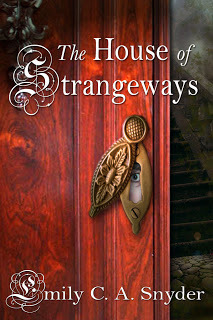 Part three of The House of Strangeways continues
here
! To read the first two installments, you can read them all
here
. Since this is a weekly serial, The House of Strangeways will remain available for longer.
Part three of The House of Strangeways continues
here
! To read the first two installments, you can read them all
here
. Since this is a weekly serial, The House of Strangeways will remain available for longer.In this chapter, The Labyrinth and the Locksmith, we learn what you hear when you put your left hand on the wall, and the dangers of eating marmalade, and the mysterious story of a locksmith who could not free his wife.
Also, Mr Mumm enjoys the sight of Miss Meadowlark attempting to flee her room by means of the window.
Very soon, we shall be meeting the elusive Mr Daedelus Stryke, but in the meantime, how much of the mystery can you solve before Miss Meadowlark gets lost in the House of Strangeways again?
Feedback and comments MORE than welcome!
Published on December 02, 2011 16:44
November 29, 2011
Occupy Microphone
To all my fellow artists, I give you
Occupy Microphone
.
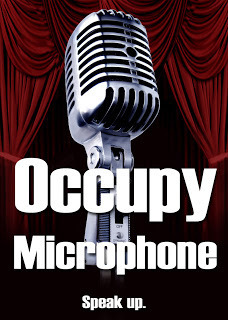 SPEAK UP
SPEAK UP
When I returned to university for my masters degree, I suddenly found myself quietly, politely, and firmly silenced. As a Christian in the arts, I was perceived as a danger. No one was ever rude, but there was simply no room for debate, no desire to consider an issue: only the unspoken injunction to conform or remain silent.
I hadn't realized how much this silencing was affecting me until one day in class my professor brought in an array of items for us to choose and use in a theatrical exercise. I was immediately drawn to a set of delicate windchimes which I let jangle while we all waited for further instruction.
When, suddenly, from somewhere in the circle a fellow student called out irritably: "Will whoever has the windchimes SHUT THEM UP?"
Immediately, I grasped the windchimes, closing them in my hand and hiding them. A moment before they had been making beautiful, communal, chaotic music - now they were deadened. And by my hand.
I realized at that instant that I felt like those windchimes. Particularly as a theatre artist who depends upon the harmony of chaos and control in creating live performances, who had previously spent her days debating the deeper, harder issues with her students in theology class where everything was discussed - I now was silenced.
And I had silenced myself.
Art does not need to be directly confrontational. But it does need to open up debate. Art does not need to fully, philosophically point to all answers, but it needs to open up the path to them. An artist who is silent has nothing to say, and does no one any good. An artist must speak up: speak hope, speak truth, speak beauty.
Speak up, artists. Debate. Converse. Challenge.
Occupy Microphone.
MANIFESTO
Man will be saved by beauty. ~ Fyodor Dostoyevsky, The Brothers Karamazov
Do not be afraid. Do not be satisfied with mediocrity. Coraggio! ~ Pope John Paul II, First speech as Pope 1978
Finally, brothers, whatever is true, whatever is noble, whatever is right, whatever is pure, whatever is lovely, whatever is admirable - if anything is excellent or praiseworthy - think about such things. ~ St. Paul, Philippians 4:8

 SPEAK UP
SPEAK UPWhen I returned to university for my masters degree, I suddenly found myself quietly, politely, and firmly silenced. As a Christian in the arts, I was perceived as a danger. No one was ever rude, but there was simply no room for debate, no desire to consider an issue: only the unspoken injunction to conform or remain silent.
I hadn't realized how much this silencing was affecting me until one day in class my professor brought in an array of items for us to choose and use in a theatrical exercise. I was immediately drawn to a set of delicate windchimes which I let jangle while we all waited for further instruction.
When, suddenly, from somewhere in the circle a fellow student called out irritably: "Will whoever has the windchimes SHUT THEM UP?"
Immediately, I grasped the windchimes, closing them in my hand and hiding them. A moment before they had been making beautiful, communal, chaotic music - now they were deadened. And by my hand.
I realized at that instant that I felt like those windchimes. Particularly as a theatre artist who depends upon the harmony of chaos and control in creating live performances, who had previously spent her days debating the deeper, harder issues with her students in theology class where everything was discussed - I now was silenced.
And I had silenced myself.
Art does not need to be directly confrontational. But it does need to open up debate. Art does not need to fully, philosophically point to all answers, but it needs to open up the path to them. An artist who is silent has nothing to say, and does no one any good. An artist must speak up: speak hope, speak truth, speak beauty.
Speak up, artists. Debate. Converse. Challenge.
Occupy Microphone.
MANIFESTO
Man will be saved by beauty. ~ Fyodor Dostoyevsky, The Brothers Karamazov
Do not be afraid. Do not be satisfied with mediocrity. Coraggio! ~ Pope John Paul II, First speech as Pope 1978
Finally, brothers, whatever is true, whatever is noble, whatever is right, whatever is pure, whatever is lovely, whatever is admirable - if anything is excellent or praiseworthy - think about such things. ~ St. Paul, Philippians 4:8
Published on November 29, 2011 15:26
November 27, 2011
Light Princess: Not All Who Wander are Lost
I'm adapting The Light Princess by George MacDonald for Festival Competition play this year, and I ran across this gorgeous quote:
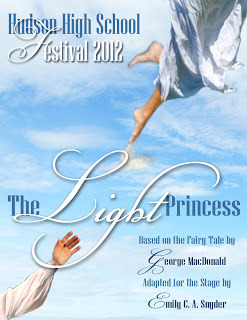
I love George MacDonald. And I love chamber theatre. The opportunity to put these two together means that the Prince who is - in the fairy tale - one of those hopeless romantics, in my version of the play is the one who speaks those lines, while the Princess (floating unnoticed behind him) overhears it.
If you don't know The Light Princess, run to read it (or amble to the synopsis ). It's a beautiful fairy tale, with terrible (and wonderful) puns on what it means to be light; what it means to have no gravity. George MacDonald is a dream-like fantasist, who greatly influenced C. S. Lewis.
His books are all worth reading...and since he wrote in the 1850's, they're also all free! Next to The Light Princess, his novel The Princess and Curdie (the sequel to The Princess and the Goblin) is my favorite.
Happy reading!

These forests are very useful in deliveringprinces from their courtiers, then the princes get away to follow theirfortunes. In this way they have the advantage over the princesses, who areforced to marry before they have had a bit of fun. I wish our princesses gotlost in a forest sometimes.
I love George MacDonald. And I love chamber theatre. The opportunity to put these two together means that the Prince who is - in the fairy tale - one of those hopeless romantics, in my version of the play is the one who speaks those lines, while the Princess (floating unnoticed behind him) overhears it.
If you don't know The Light Princess, run to read it (or amble to the synopsis ). It's a beautiful fairy tale, with terrible (and wonderful) puns on what it means to be light; what it means to have no gravity. George MacDonald is a dream-like fantasist, who greatly influenced C. S. Lewis.
His books are all worth reading...and since he wrote in the 1850's, they're also all free! Next to The Light Princess, his novel The Princess and Curdie (the sequel to The Princess and the Goblin) is my favorite.
Happy reading!
Published on November 27, 2011 19:59
November 25, 2011
Free Friday: House of Strangeways (Pt. 2)
 Welcome to Black Friday here at O Beauty Unattempted! In case you're waiting in those pesky lines up to the counter, or whether you're at home avoiding crowds, we've got you covered with this week's installment of The House of Strangeways. (You can read Part 1
here
. And yes, it was previously known as Confessions of a Gothic Governess)
Welcome to Black Friday here at O Beauty Unattempted! In case you're waiting in those pesky lines up to the counter, or whether you're at home avoiding crowds, we've got you covered with this week's installment of The House of Strangeways. (You can read Part 1
here
. And yes, it was previously known as Confessions of a Gothic Governess)Reader beware, though, don't read this alone at night. Or do.
Since the text formatting seemed to give some people some trouble, I've reverted back to normal typeface. Let me know what you prefer, please!
And enjoy! If you dare. *cue thunder*
Notes: You can read Part 2 by clicking the fly-out button below or clicking here . If you're in the mood for something more spoofy, take a look at Nachtsturm Castle ...and at the Action!Henry scene, available for a few more days. (Each Free Friday is available for 30 days.)
Published on November 25, 2011 00:18
Free Friday: Confessions of a Gothic Governess (Part 2)
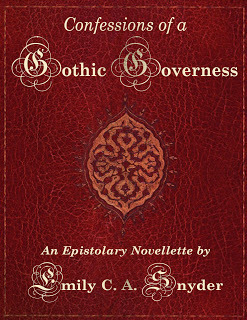 Welcome to Black Friday here at O Beauty Unattempted! In case you're waiting in those pesky lines up to the counter, or whether you're at home avoiding crowds, we've got you covered with this week's installment of Confessions of a Gothic Governess. (You can read Part 1
here
.)
Welcome to Black Friday here at O Beauty Unattempted! In case you're waiting in those pesky lines up to the counter, or whether you're at home avoiding crowds, we've got you covered with this week's installment of Confessions of a Gothic Governess. (You can read Part 1
here
.)Reader beware, though, don't read this alone at night. Or do.
Since the text formatting seemed to give some people some trouble, I've reverted back to normal typeface. Let me know what you prefer, please!
And enjoy! If you dare. *cue thunder*
Notes: You can read Part 2 by clicking the fly-out button below or clicking here . If you're in the mood for something more spoofy, take a look at Nachtsturm Castle ...and at the Action!Henry scene, available for a few more days. (Each Free Friday is available for 30 days.)
Published on November 25, 2011 00:18
November 21, 2011
Teatime Ten: Maria Grazia
Many of you know Maria Grazia as the editrix of
My Jane Austen Fan Club
(wherein I recently got to
Talk Austen
with her!) and
The Everything Austen Daily
. But did you also know that she teaches English in Italy? And is an avid fan of Richard Armitage? (Clearly, a woman of taste!)Well, now it's time for the interviewer to be interviewed! So sweeten that tea, break out the clotted cream, and join us for the
Teatime Ten
(now in a monthly edition) with Maria Grazia!
Hello Maria! Thanks so much for joining us for the TeatimeTen. Tell us a little bit about how you came to love Jane Austen.
[image error] Oh! The firsttime I read her Pride and Prejudice, an entire new world was revealed to my young-teen-living-in-the-provinces-and-knowing-nothing-of-the-world inexperienced mind. I was so naive I even liked Wickham as much as Elizabethand disliked Darcy as much as her! Never been caught in that trap again. ;-)
But I only read the rest of her work when Iwas at university and beyond - so as anadult. Actually, a revival of my fondness came after watching P&P 2005 atthe cinema. Yes, I know, I know, it is not the most faithful adaptation but itwas my first one (**blushes** ) Darcy/Firth only came... second. I've startedcollecting adaptations of classics after P&P 2005. So it was then when my period drama mania had its start. Butthat's another story.
How did you come to startyour blog? What did you want to focus on?
I started blogging in 2008 for my students at Learnonline and I still regularly add audio/video/didactic materials there. So, after discovering the blogosphere was such fun,I wished I had a special corner for mypassions and started FLYHIGH! where I write about literature, books, art, journeysand trips, school, period drama, movies, TV series, theatre and, of course, "myone weakness," that is my favourite actor, Richard Armitage.
I noticed that many of my posts tended to beAusten-related, so when one day at the local public library they asked me toorganize and moderate a "Jane Austen Book Club," I decided to start a third siteto support and report about that experience. I wanted it to be "Afriendly meeting place to discuss everything Austen..." - hence My Jane AustenBook Club .
I have met so many interesting people and learnt somuch since I've started blogging. Believe it or not, but my life has radicallychanged!
I love the Everything Austen Daily! How do you find yourarticles? What prompted you to start it?
That'sa very easy task. Anybody could start his/her own daily paper. You must set thetags or key words you're interested in and then the paper is automaticallydone. As an editor, I check what theyhave picked up from twitter and delete what is not actually Austen-related. Apiece of cake, isn't it?
Wow. It really is. Can you give six tips to those interested in starting their ownpaper or blog?
Tips? I'm notthat expert, you know? I'm always askingfor tips myself from bloggers I "virtually" meet online. But I'll try to findsomething useful to say, let's see...
Write about things you really likeMake your blog a friendly placeTry to create a net of mates/ friends taking part in blog events, hops, meme.Try to use twitter/facebook to publicize what you write aboutDon't write a blog copying another very popular one. If it already exists and is popular, why should people read a similar less popular one? So try to be original, create your own style. Last but not least, be politically and intellectually correct/honest/coherent I'm amazed that you teach ESL in Italy to high school students... and find time for everythingelse. How do you balance your days?
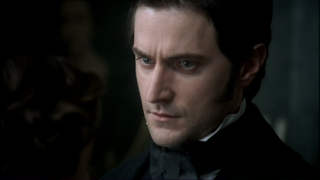 Ehm, first of all my days are not ... balanced at all, they are frantic! But my answer is: to manage everything, I've had to become a multi-tasker, just like my teenage students. Something like...correctingtests and papers with music and twitter on? Or I sleep less. I answer e-mails very early in the morning(when my American mates/friends are still up) while having my first cappuccino orwrite posts/interviews at night (until 1 / 2 a.m.) after finishing correctingor preparing notes or power point slides for my lessons. What is really difficult is that with my different class-groupsI have to cover all English literature from the origins to nowadays: pills (onlyone hour a week) of literature for my youngest students (16) from the originsto Shakespeare the poet; a bit more when they are in the 4th year(and 17) from the Elizabethan Drama to the Early Romantic Age; and, finally, in their last year at school, they study the 19th, 20th,21st centuries. I selectauthors, texts and themes but it is, however, pretty much to deal with.
Ehm, first of all my days are not ... balanced at all, they are frantic! But my answer is: to manage everything, I've had to become a multi-tasker, just like my teenage students. Something like...correctingtests and papers with music and twitter on? Or I sleep less. I answer e-mails very early in the morning(when my American mates/friends are still up) while having my first cappuccino orwrite posts/interviews at night (until 1 / 2 a.m.) after finishing correctingor preparing notes or power point slides for my lessons. What is really difficult is that with my different class-groupsI have to cover all English literature from the origins to nowadays: pills (onlyone hour a week) of literature for my youngest students (16) from the originsto Shakespeare the poet; a bit more when they are in the 4th year(and 17) from the Elizabethan Drama to the Early Romantic Age; and, finally, in their last year at school, they study the 19th, 20th,21st centuries. I selectauthors, texts and themes but it is, however, pretty much to deal with.
Do you find there's adifference in how Americans vs. Europeans approach literature? That's a tough one, first of all because I know very littleabout Americans' approach to literature. And if I must be honest, I don't evenfollow any official methodology for the teaching of language and literature.But, being the daughter of a very boring/dull/ uninteresting/formal approach toliterature both at high school and at university, I've tried to find my ownway. What I can say about us in Italy is that we are still totally free to pickup the authors and texts we like as well as the methodology we prefer.
As for myself,I use the language as much as I can to communicate (English is a foreignlanguage to them, not a second one), I use literature to make my studentsrecognize/discover themselves orconnections to their own world and needs (a humanistic approach?), I supportmy lessons with audio/visual/interactive tools as often as I can.
Sounds great to me! What do youlook for in a good book?
I'm rather schizophrenic (but not dangerous!) as for my attitudeto books. I read and manage to appreciate very different stuff. Anyhow, myattitude depends if I'm reading fanfiction, a best-seller (I tend to be veryhard on those!) or literature. I switchmy "criticism button" right or left (but never OFF), according to what kind of book I'm reading. Ifit is a light, escape read, it must beintelligent and well-written but I can suspend disbelief for a while.
If it is literature or aclassic, I turn into the teacher I am and start noticing, analyzing, comparing.But in order to like a classic also, it must be thought-provoking andwell-written.
Did you notice any type of book I can't renounce?
So let's talkbooks! You've been locked in your room by a nefarious villain, who's onlygiven you two novels for comfort. What are those novels and why?
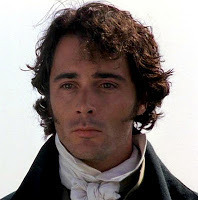 Mind you, I like villains. Is "my nefarious villain" here morelike a wicked libertine (Robert Lovelace? John Willoughby?) or a gothicmonster? Well, I hope he is one of the first type. I love them! And if he evenlet me keep my two favourite novels with me...awwww...he's a darling! I'll keep Jane Austen's "Persuasion" and MrsGaskell's "North and South" with me, thank you.
Mind you, I like villains. Is "my nefarious villain" here morelike a wicked libertine (Robert Lovelace? John Willoughby?) or a gothicmonster? Well, I hope he is one of the first type. I love them! And if he evenlet me keep my two favourite novels with me...awwww...he's a darling! I'll keep Jane Austen's "Persuasion" and MrsGaskell's "North and South" with me, thank you.
Why? Simply because I love them both, differently, but verymuch.Now for alittle Austen fun: if you could pair up any two characters from different Austen novels, who would you pair up and why are they perfect foreach other?
I hope Mr Darcy would not be angry with me, it's just a game,isn't it? And I apologize with Catherine, but she mustn't feel offended. I'dlove to see Henry Tilney interacting with Elizabeth Bennet. They are bothbrilliant minds, so witty and smart, whileMr Darcy and Catherine Morland totally lack humour and wit. Wouldn't Henry and Lizzie be an extraordinarilywell-matched couple? Actually...that does sound fantastic. (With all apologies to their respective others.) Then what's next for MariaGrazia? More teaching, more blogging, more reading, more period drama, more art exhibitions, moregood movies, more theatre, more trips to the UK. Fingers crossed! Ooops... I forgot morehousework, laundry, ironing, driving sons, cooking meals... :-/ Did you think my life was all Jane Austen andShakespeare?
Thank you so much for joining us, Maria!
 Maria Grazia is the editrix of
My Jane Austen Bookclub
and the
Everything Austen Daily
, as well as
Learn On-Line
and
Fly High!
She lives in Italy.
Maria Grazia is the editrix of
My Jane Austen Bookclub
and the
Everything Austen Daily
, as well as
Learn On-Line
and
Fly High!
She lives in Italy.
You can follow her via Twitter and Facebook (Fly High) or Facebook (Jane Austen). You can also find her on YouTube and Vimeo , Paperblog and Blogworld (Tumblr) .
Hello Maria! Thanks so much for joining us for the TeatimeTen. Tell us a little bit about how you came to love Jane Austen.
[image error] Oh! The firsttime I read her Pride and Prejudice, an entire new world was revealed to my young-teen-living-in-the-provinces-and-knowing-nothing-of-the-world inexperienced mind. I was so naive I even liked Wickham as much as Elizabethand disliked Darcy as much as her! Never been caught in that trap again. ;-)
But I only read the rest of her work when Iwas at university and beyond - so as anadult. Actually, a revival of my fondness came after watching P&P 2005 atthe cinema. Yes, I know, I know, it is not the most faithful adaptation but itwas my first one (**blushes** ) Darcy/Firth only came... second. I've startedcollecting adaptations of classics after P&P 2005. So it was then when my period drama mania had its start. Butthat's another story.
How did you come to startyour blog? What did you want to focus on?
I started blogging in 2008 for my students at Learnonline and I still regularly add audio/video/didactic materials there. So, after discovering the blogosphere was such fun,I wished I had a special corner for mypassions and started FLYHIGH! where I write about literature, books, art, journeysand trips, school, period drama, movies, TV series, theatre and, of course, "myone weakness," that is my favourite actor, Richard Armitage.
I noticed that many of my posts tended to beAusten-related, so when one day at the local public library they asked me toorganize and moderate a "Jane Austen Book Club," I decided to start a third siteto support and report about that experience. I wanted it to be "Afriendly meeting place to discuss everything Austen..." - hence My Jane AustenBook Club .
I have met so many interesting people and learnt somuch since I've started blogging. Believe it or not, but my life has radicallychanged!
I love the Everything Austen Daily! How do you find yourarticles? What prompted you to start it?
That'sa very easy task. Anybody could start his/her own daily paper. You must set thetags or key words you're interested in and then the paper is automaticallydone. As an editor, I check what theyhave picked up from twitter and delete what is not actually Austen-related. Apiece of cake, isn't it?
Wow. It really is. Can you give six tips to those interested in starting their ownpaper or blog?
Tips? I'm notthat expert, you know? I'm always askingfor tips myself from bloggers I "virtually" meet online. But I'll try to findsomething useful to say, let's see...
Write about things you really likeMake your blog a friendly placeTry to create a net of mates/ friends taking part in blog events, hops, meme.Try to use twitter/facebook to publicize what you write aboutDon't write a blog copying another very popular one. If it already exists and is popular, why should people read a similar less popular one? So try to be original, create your own style. Last but not least, be politically and intellectually correct/honest/coherent I'm amazed that you teach ESL in Italy to high school students... and find time for everythingelse. How do you balance your days?
 Ehm, first of all my days are not ... balanced at all, they are frantic! But my answer is: to manage everything, I've had to become a multi-tasker, just like my teenage students. Something like...correctingtests and papers with music and twitter on? Or I sleep less. I answer e-mails very early in the morning(when my American mates/friends are still up) while having my first cappuccino orwrite posts/interviews at night (until 1 / 2 a.m.) after finishing correctingor preparing notes or power point slides for my lessons. What is really difficult is that with my different class-groupsI have to cover all English literature from the origins to nowadays: pills (onlyone hour a week) of literature for my youngest students (16) from the originsto Shakespeare the poet; a bit more when they are in the 4th year(and 17) from the Elizabethan Drama to the Early Romantic Age; and, finally, in their last year at school, they study the 19th, 20th,21st centuries. I selectauthors, texts and themes but it is, however, pretty much to deal with.
Ehm, first of all my days are not ... balanced at all, they are frantic! But my answer is: to manage everything, I've had to become a multi-tasker, just like my teenage students. Something like...correctingtests and papers with music and twitter on? Or I sleep less. I answer e-mails very early in the morning(when my American mates/friends are still up) while having my first cappuccino orwrite posts/interviews at night (until 1 / 2 a.m.) after finishing correctingor preparing notes or power point slides for my lessons. What is really difficult is that with my different class-groupsI have to cover all English literature from the origins to nowadays: pills (onlyone hour a week) of literature for my youngest students (16) from the originsto Shakespeare the poet; a bit more when they are in the 4th year(and 17) from the Elizabethan Drama to the Early Romantic Age; and, finally, in their last year at school, they study the 19th, 20th,21st centuries. I selectauthors, texts and themes but it is, however, pretty much to deal with. Do you find there's adifference in how Americans vs. Europeans approach literature? That's a tough one, first of all because I know very littleabout Americans' approach to literature. And if I must be honest, I don't evenfollow any official methodology for the teaching of language and literature.But, being the daughter of a very boring/dull/ uninteresting/formal approach toliterature both at high school and at university, I've tried to find my ownway. What I can say about us in Italy is that we are still totally free to pickup the authors and texts we like as well as the methodology we prefer.
As for myself,I use the language as much as I can to communicate (English is a foreignlanguage to them, not a second one), I use literature to make my studentsrecognize/discover themselves orconnections to their own world and needs (a humanistic approach?), I supportmy lessons with audio/visual/interactive tools as often as I can.
Sounds great to me! What do youlook for in a good book?
I'm rather schizophrenic (but not dangerous!) as for my attitudeto books. I read and manage to appreciate very different stuff. Anyhow, myattitude depends if I'm reading fanfiction, a best-seller (I tend to be veryhard on those!) or literature. I switchmy "criticism button" right or left (but never OFF), according to what kind of book I'm reading. Ifit is a light, escape read, it must beintelligent and well-written but I can suspend disbelief for a while.
If it is literature or aclassic, I turn into the teacher I am and start noticing, analyzing, comparing.But in order to like a classic also, it must be thought-provoking andwell-written.
Did you notice any type of book I can't renounce?
So let's talkbooks! You've been locked in your room by a nefarious villain, who's onlygiven you two novels for comfort. What are those novels and why?
 Mind you, I like villains. Is "my nefarious villain" here morelike a wicked libertine (Robert Lovelace? John Willoughby?) or a gothicmonster? Well, I hope he is one of the first type. I love them! And if he evenlet me keep my two favourite novels with me...awwww...he's a darling! I'll keep Jane Austen's "Persuasion" and MrsGaskell's "North and South" with me, thank you.
Mind you, I like villains. Is "my nefarious villain" here morelike a wicked libertine (Robert Lovelace? John Willoughby?) or a gothicmonster? Well, I hope he is one of the first type. I love them! And if he evenlet me keep my two favourite novels with me...awwww...he's a darling! I'll keep Jane Austen's "Persuasion" and MrsGaskell's "North and South" with me, thank you. Why? Simply because I love them both, differently, but verymuch.Now for alittle Austen fun: if you could pair up any two characters from different Austen novels, who would you pair up and why are they perfect foreach other?
I hope Mr Darcy would not be angry with me, it's just a game,isn't it? And I apologize with Catherine, but she mustn't feel offended. I'dlove to see Henry Tilney interacting with Elizabeth Bennet. They are bothbrilliant minds, so witty and smart, whileMr Darcy and Catherine Morland totally lack humour and wit. Wouldn't Henry and Lizzie be an extraordinarilywell-matched couple? Actually...that does sound fantastic. (With all apologies to their respective others.) Then what's next for MariaGrazia? More teaching, more blogging, more reading, more period drama, more art exhibitions, moregood movies, more theatre, more trips to the UK. Fingers crossed! Ooops... I forgot morehousework, laundry, ironing, driving sons, cooking meals... :-/ Did you think my life was all Jane Austen andShakespeare?
Thank you so much for joining us, Maria!
 Maria Grazia is the editrix of
My Jane Austen Bookclub
and the
Everything Austen Daily
, as well as
Learn On-Line
and
Fly High!
She lives in Italy.
Maria Grazia is the editrix of
My Jane Austen Bookclub
and the
Everything Austen Daily
, as well as
Learn On-Line
and
Fly High!
She lives in Italy. You can follow her via Twitter and Facebook (Fly High) or Facebook (Jane Austen). You can also find her on YouTube and Vimeo , Paperblog and Blogworld (Tumblr) .
Published on November 21, 2011 19:31
November 18, 2011
Free Friday Tempest-Tossed!
I'm afraid that there's no Free Friday this week, because Tempest performs this weekend...but we'll be back in time for Thanksgiving!
In the meantime, there are three more days to read Disarming Mr Darcy !
Enjoy and see you next week!
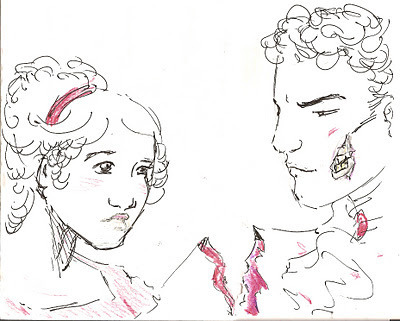

In the meantime, there are three more days to read Disarming Mr Darcy !
Enjoy and see you next week!

Published on November 18, 2011 13:04
November 15, 2011
Macbeth on the Beach
To make a living as a director, sometimes you have to have lots and lots and lots of projects going at once. I'm not quite finished with
Tempest
- and already I have to think about the next few projects! I'll be doing:
The Light Princess with Hudson High School (from the George MacDonald story, adapted by me...over Thanksgiving Break!). This is the same group I'm doing Tempest with...and with whom I've done A Comedy of Murders, Tartuffe, Curses! (and No Boys Allowed and Crying Wolf), The Romancers, Little Women, Pink Noir, I Never Saw Another Butterfly, Our Town, and Wallace's Will .
Civil War Stories with the Framingham Community Theater , with whom I did Agatha Christie's And Then There Were None , and my original dinner theatre, Heirs & Errors . CWS is written by FCT, taken from actual source documents.
And, last but certainly not least, Macbeth in Concord, MA, with Theater 906 . It's Mackers on the Beach, Murder on the Boardwalk, castles of sand, rivers of blood, and I'm terribly excited. The idea is that we tend to go to Mackers thinking only of how well we know the lines, and not how terrible and tragic the loss of life is. We recite the deaths, we look on Macbeth's rise and fall with a literary eye, we smile and applaud. And then we do the same in real life. I want, by softening the look of the show, to stab the audience's nerves awake. Here's the poster. I'm rather proud of it!


The Light Princess with Hudson High School (from the George MacDonald story, adapted by me...over Thanksgiving Break!). This is the same group I'm doing Tempest with...and with whom I've done A Comedy of Murders, Tartuffe, Curses! (and No Boys Allowed and Crying Wolf), The Romancers, Little Women, Pink Noir, I Never Saw Another Butterfly, Our Town, and Wallace's Will .
Civil War Stories with the Framingham Community Theater , with whom I did Agatha Christie's And Then There Were None , and my original dinner theatre, Heirs & Errors . CWS is written by FCT, taken from actual source documents.
And, last but certainly not least, Macbeth in Concord, MA, with Theater 906 . It's Mackers on the Beach, Murder on the Boardwalk, castles of sand, rivers of blood, and I'm terribly excited. The idea is that we tend to go to Mackers thinking only of how well we know the lines, and not how terrible and tragic the loss of life is. We recite the deaths, we look on Macbeth's rise and fall with a literary eye, we smile and applaud. And then we do the same in real life. I want, by softening the look of the show, to stab the audience's nerves awake. Here's the poster. I'm rather proud of it!

Published on November 15, 2011 12:58
November 14, 2011
Surviving Seventy-Two Munchkins
This is my brief bio for my application to Columbia's MFA in Theatre Directing. I think it says it all!
I became a theatre major on a dare.
A friend in undergraduate college bet methat acting was all about unbridled emotion—that sort of theatre which involvesa lot of scarf-flinging and little else, and precisely that sort of theatrewhich I hated—while I maintained that there must be some order in acting, and interest in the well-being of others.
I took that theatre course—fully intendingto roll my eyes—and instead, I fell in love. Here was a place to challengeme; here was freedom in discipline; here was all the world in miniature; here, simply, was home.
Immediately, I changed my major fromCreative Writing to Theatre, with an emphasis in Directing. My muddled thinking was: "Theatre is such aridiculous and impractical profession. I'll take it in college, because clearlyno one actually makes a living in the arts!"
Which only goes to prove that God lovesgood dramatic irony.
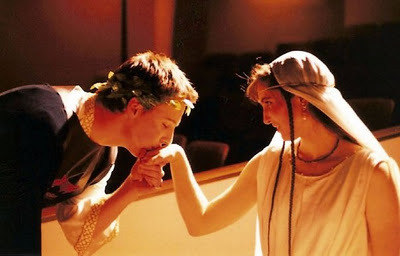 Salome at Anathan Theatre in 1999
Salome at Anathan Theatre in 1999
My Senior Thesis Project at Franciscan University of Steubenville
My first teaching position out of collegewas for a K-8 private school. There Itaught both music and art, and was informed that I would direct and produce The Wizard of Oz, with no budget, noscript, no support, and all 425 students participating. I had 72 Munchkins. (And 64 cornstalks, 64 poppies, and the fifthgrade boys were typecast as flying monkeys.) At one point, while making poppy headbands out of wire, red paper, andglue, I was watching a documentary on the making of Riverdance. A voice over ina posh British accent drawled: "At one point I had ninety actors! NINETY! I had never worked with a cast that large." I threw my glue sticks at the TV and criedthat I would kill for ninety actors! I went each day to tech, chanting to myself:"If you can survive this, Emily, you can survive anything!"
I guess I did.

A few of the sixty-four poppies!
More than ten years later, I am still aprofessional director, educator, author and playwright. I have taught theatre to students rangingfrom ages seven to seventy, in formal classrooms, seminars, and rehearsals. I've directed almost fifty productions,founded three unique drama programs (two in schools, one independently), andexpanded a fourth. I have written andhad produced over fifty plays, four of which are published with Playscripts,Inc., and which have played from Chicago, Illinois, to Dublin, Ireland, toChristchurch, New Zealand.
In 2000, I studied Shakespearean verseacting with former members of the Royal Shakespeare Company in London andStratford-upon-Avon, England. In 2006, Ifounded my own summer Shakespeare company, Gaudete Academy, for adolescents andyoung adults. In 2009, my first five actiambic pentameter play, Cupid and Psyche ,premiered in Boston.
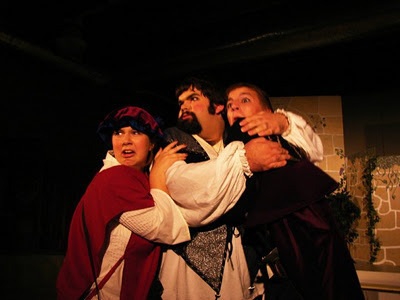 Grumio, Lucentio and Petruchio brave the crazy wedding partyin Gaudete Academy's 2010 production of The Taming of the Shrew
Grumio, Lucentio and Petruchio brave the crazy wedding partyin Gaudete Academy's 2010 production of The Taming of the Shrew
I have yet to be saddled with another castof hundreds, but I have had the transformer blow half an hour before show and the show still go on with audiencemembers holding flashlights (French Butler). I've had mycast plagued by walking pneumonia (King of Fools), performed despite African weddings dancing loudlyabove our heads (Taming of the Shrew AND As You Like It), and created rules for rowdy adolescents, such as: "Thefurniture is not for fun" (Tempest).
I've also had the privilege of putting onsome damn fine plays—plays that still live vibrantly in my soul, and which to returnto is the essence of 'bittersweet.' It'sa strange thing to create a world and then destroy it. But beautiful, too. And I wouldn't dare change it.
I became a theatre major on a dare.
A friend in undergraduate college bet methat acting was all about unbridled emotion—that sort of theatre which involvesa lot of scarf-flinging and little else, and precisely that sort of theatrewhich I hated—while I maintained that there must be some order in acting, and interest in the well-being of others.
I took that theatre course—fully intendingto roll my eyes—and instead, I fell in love. Here was a place to challengeme; here was freedom in discipline; here was all the world in miniature; here, simply, was home.
Immediately, I changed my major fromCreative Writing to Theatre, with an emphasis in Directing. My muddled thinking was: "Theatre is such aridiculous and impractical profession. I'll take it in college, because clearlyno one actually makes a living in the arts!"
Which only goes to prove that God lovesgood dramatic irony.
 Salome at Anathan Theatre in 1999
Salome at Anathan Theatre in 1999My Senior Thesis Project at Franciscan University of Steubenville
My first teaching position out of collegewas for a K-8 private school. There Itaught both music and art, and was informed that I would direct and produce The Wizard of Oz, with no budget, noscript, no support, and all 425 students participating. I had 72 Munchkins. (And 64 cornstalks, 64 poppies, and the fifthgrade boys were typecast as flying monkeys.) At one point, while making poppy headbands out of wire, red paper, andglue, I was watching a documentary on the making of Riverdance. A voice over ina posh British accent drawled: "At one point I had ninety actors! NINETY! I had never worked with a cast that large." I threw my glue sticks at the TV and criedthat I would kill for ninety actors! I went each day to tech, chanting to myself:"If you can survive this, Emily, you can survive anything!"
I guess I did.

A few of the sixty-four poppies!
More than ten years later, I am still aprofessional director, educator, author and playwright. I have taught theatre to students rangingfrom ages seven to seventy, in formal classrooms, seminars, and rehearsals. I've directed almost fifty productions,founded three unique drama programs (two in schools, one independently), andexpanded a fourth. I have written andhad produced over fifty plays, four of which are published with Playscripts,Inc., and which have played from Chicago, Illinois, to Dublin, Ireland, toChristchurch, New Zealand.
In 2000, I studied Shakespearean verseacting with former members of the Royal Shakespeare Company in London andStratford-upon-Avon, England. In 2006, Ifounded my own summer Shakespeare company, Gaudete Academy, for adolescents andyoung adults. In 2009, my first five actiambic pentameter play, Cupid and Psyche ,premiered in Boston.
 Grumio, Lucentio and Petruchio brave the crazy wedding partyin Gaudete Academy's 2010 production of The Taming of the Shrew
Grumio, Lucentio and Petruchio brave the crazy wedding partyin Gaudete Academy's 2010 production of The Taming of the Shrew I have yet to be saddled with another castof hundreds, but I have had the transformer blow half an hour before show and the show still go on with audiencemembers holding flashlights (French Butler). I've had mycast plagued by walking pneumonia (King of Fools), performed despite African weddings dancing loudlyabove our heads (Taming of the Shrew AND As You Like It), and created rules for rowdy adolescents, such as: "Thefurniture is not for fun" (Tempest).
I've also had the privilege of putting onsome damn fine plays—plays that still live vibrantly in my soul, and which to returnto is the essence of 'bittersweet.' It'sa strange thing to create a world and then destroy it. But beautiful, too. And I wouldn't dare change it.
Published on November 14, 2011 01:14



